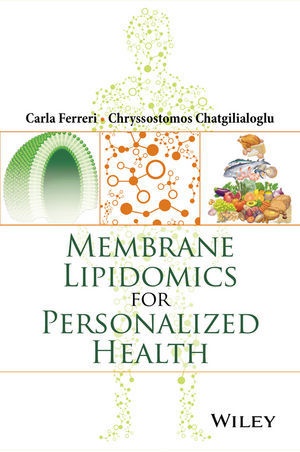Read more
Membrane Lipidomics for Personalized Health Care uses a simple and practical approach to outline the basics of lipidomics and its relationships with health and nutrition.
List of contents
About the Authors xi
Preface xiii
Acknowledgments xvii
Abbreviations xix
Part I Molecular and Nutritional Basis of Cell Membranes and Lipidomics 1
1 Membranes for Life and Life for Membranes 3
1.1 Cell Membranes: The Role of Fatty Acids and the Exclusion of Trans Isomers 3
1.2 Organization and Homeostasis 11
1a In Depth: The Formation of a Cell Membrane 16
1b In Depth: Cholesterol and Membranes 17
1c In Depth: Lipid Rafts 19
2 Fatty Acid Families: Metabolism and Nutrition 21
2.1 Saturated Fatty Acids: Biosynthesis and Dietary Regulation 23
2.2 Monounsaturated Fatty Acids: The Importance to be cis 28
2a In Depth: The key Steps of Phospholipid Synthesis 31
2b In Depth: Biosynthesis of the Double Bond and Desaturase Features 34
2.3 Polyunsaturated Fatty Acids: The Essentiality for Human Cells 37
Concepts' Summary 38
S1 Beware of the Nutritional Label! 38
S2 The Optimal Values of Fatty Acids in Tissues 38
S3 Structural Role of Fatty Acids 40
3 Essential Fatty Acids 41
3.1 The Omega-6 and Omega-3 Families: Cascades and Regulation 42
3a In Depth: The Definition of Omega-6 and Omega-3 48
3b The Polyunsaturated Fatty Acids in Cell Membrane Remodeling 50
3c In Depth: How do you Define an Inflammatory Pathway? 55
3.2 The Balance Between Omega-6 and Omega-3 Pathways: Nutritional and Metabolic Considerations 56
3.3 Food and Membranes: A Virtuous Cycle 60
4 Free Radicals and Lipids: Trans and Oxidized Fatty Acids 65
4.1 Trans Fatty Acids for Humans: The Nutritional Intake 66
4.2 Endogenous Sources of Trans Fatty Acids by Free Radical Stress 71
4.3 Free Radicals and Lipid Oxidation: The Threshold for Health 73
4.4 Lipoproteins and Development of Markers for Lipid Reactivity 79
4a In Depth: Oleic versus Linoleic Acid Reactivity with Free Radicals 83
Concepts' Summary 84
S1 Fatty Acid Geometry: A "Radical" Change 84
S2 Antioxidants for Membranes 85
Part II Membrane Lipidomics for Personalized Health 87
5 What Is Lipidomics for Health 89
5.1 The Birth of the Postgenomics Era 89
5.2 Lipidomics in the Postgenomic Era 92
5.3 Fatty Acids Involved in Membrane and Mediator Lipidomics 93
5.4 Membrane Lipidomics: Cellular Stress, Turnover, and Opportunities 95
5.4.1 How Does the Stress Involve Membranes? 97
5.5 Phospholipids From Dietary Intakes to Biological Functions 100
6 Lipidomics of Erythrocyte Membranes 105
6.1 Erythrocyte as a Comprehensive Health Biomarker 107
6.2 The Optimal Value Intervals and The Membrane Unbalance Index 115
6.3 Lipid Biosynthesis and Related Indices 120
6.4 The Individuation of Molecular Indicators 122
7 Nutrilipidomics 127
7.1 When Fatty Acids Become Nutraceuticals: Membrane Therapy With Nutrilipidomics 128
7.2 Fatty Acid-Based Membrane Lipidomics and Nutrilipidomics: The Personalized Approach for Nutrition and Nutraceuticals in Health and Diseases 131
8 Lipidomic Profiles and Intervention Strategies in Prevention and Diseases 135
8.1 Lipidomics and Sport 137
8.2 Lipidomics and Pregnancy 140
8.3 Lipidomics and Aging 143
8.4 Lipidomics and Cardiovascular Health 145
8.5 Lipidomics and Overweight 148
8.6 Lipidomics and Dermatology 150
8.7 Lipidomics and Neurology 151
8.8 Lipidomics and Ophtalmology 153
8.9 Conclusive Remarks 154
&
About the author
Carla FerreriConsiglio Nazionale delle Ricerche, Institute of Organic Synthesis and Photoreactivity, Italy
Chryssostomos ChatgilialogluNational Center for Scientific Research "Demokritos", Institute of Nanoscience and Nanotechnology, Greece
Summary
Lipidomics is an important aspect of personalized medicine in relation to nutrition and metabolism. This approach has become important due to the substantial presence of nutraceuticals in the market, since it gives personalized criteria on how to choose the right nutraceutical strategy for both prevention and for quality of life.

